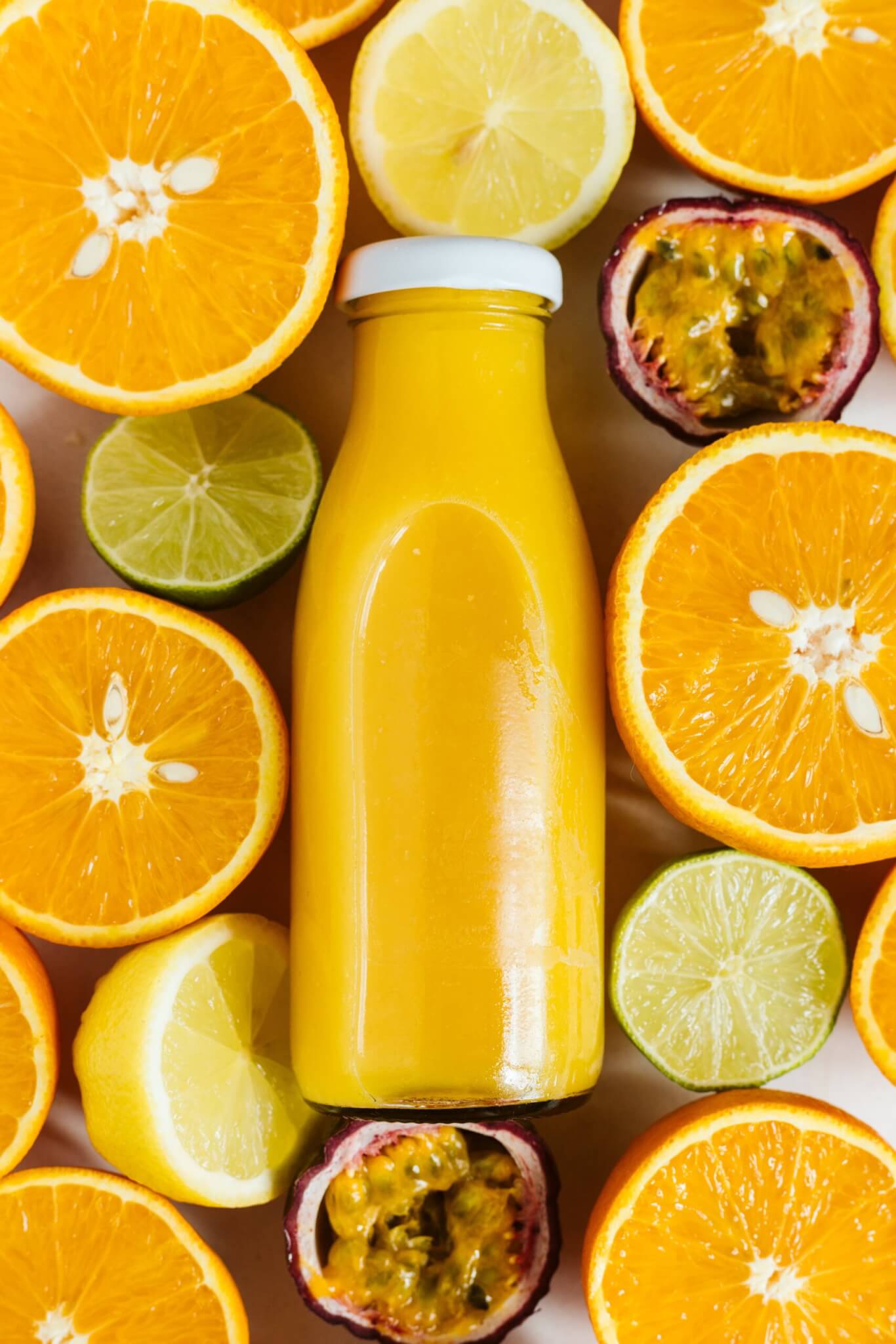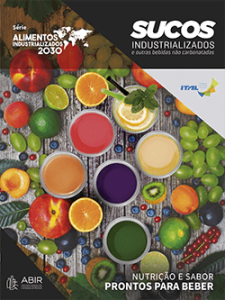NUTRITIONAL VALUE OF INDUSTRIALIZED JUICES
The types and quantities of nutrients in each juice depend on their composition. In the sample of 217 juices and other non-carbonated beverages, most of them are composed of mix of fruits and other vegetables. The most used fruits are apple, grape, orange, mango, lime, red fruits, peach, passion fruit, tangerine, strawberry, guava, cashew, banana, cranberry, pineapple, açaí and acerola. Other fruits used are prune, blackberry, aronia, coconut, kiwi, papaya, melon, pear, pomegranate and date. The most present vegetables are mint, kale, carrot, ginger, beetroot, cucumber and spinach, and there are pumpkin, agave, watercress, locus, yacon potato, cocoa, chia, grassy, hibiscus, Peruvian maca, Cayenne pepper, quinoa, celery, linseed and spirulina.
In all the analyzed products (217 items) the ingredients of mandatory statement were identified in the nutritional label: Proteins, Fibers (Dietary fiber), Calories (Energy value, kcal), Carbohydrates, Total fat, Saturated fat and Sodium. Among the nutrients voluntarily stated, Vitamin C was identified as the most relevant, informed in the label of 120 products.
VITAMIN C
The fact the statement of that nutrient is voluntary makes it difficult a more comprehensive view of the total of 217 beverages, because, even some orange juices, or mixed with orange, don’t inform the vitamin C on the label. Nevertheless, vitamin C is in great part of the analyzed juices, notably in those with citric fruit base. Among the products (120 items) that stated vitamin C on the label, 41% have a HIGH CONTENT and 73% are a SOURCE of nutrients, according to the legislation in force at the period of the data collection (Anvisa, RDC no. 54, from November 12nd, 2012).
PROTEINS
In fruit and vegetables, generally, the presence of PROTEINS is not so representative, which reflects on the industrialized beverage made with these ingredients. It is proved with the fact that 65% of the samples inform zero protein content. however, some beverages, specifically those classified as liquid food, are formulated with the claim of relevant PROTEIN content, containing up to 12.7 g per 200 ml.
FIBERS
In the beverages analyzed beverages, generally, the presence of FIBERS depends on the type of fruit and vegetables in which they are compound. In the TOTAL of the sample, 132 products (61%) inform a zero FIBERS content. However, many beverages present relevant content of FIBERS, providing the consumers up to 42% of their daily needs.
CALORIES (ENERGY VALUE)
generally, the ENERGY VALUE of juices, nectars and refreshments vary a lot according to their formulation. There are products with higher caloric value because they are made with fruit with higher sugar content naturally present in their composition, such as, for example, grape and açaí. On the other hand, following the market trend, there are several products that have reduce energetic values, with reduction of sugar added, use of sweeteners, mix of apple juice, incorporation of vegetables and even the reduction in the portions size. n the sample of 217 beverages analyzed, there are products considered as LOW in calories.
CARBOHYDRATES
The quantity of CARBOHYDRATES in juices, nectars, and refreshments vary a lot according to the type of fruits and vegetables naturally present in their composition. The sample of 217 juices and other non-carbonated beverages presented the AVERAGE of 20.8 g/200 ml of CARBOHYDRATES (6.9% of the daily needs), the HIGHER value of 48 g/200 ml and LOWER than the value of 0.0 g/200 ml.
SUGARS
From the total of the sample of 217 products, 88 products contained a quantity of sugar in the label nutritional information. The quantities of SUGAR from juices, nectars, and refreshments vary a lot according to the type of fruits and vegetables naturally present in their composition, from 2.0 g/200 ml up to 32.7 g/200 ml.
TOTAL FATS
Generally, juices, nectars, refreshments and liquid food do not have relevant quantities of FAT. In the TOTAL of the sample of (217 products), 90.3% informed zero FAT content, while the remaining has a content equal or lower than 5 g/200 ml, considered as a LOW content according to the legislation (lower than 3 g of total fat per 100 ml of product).
SODIUM
Generally, juices, nectars, refreshments and liquid food do not have relevant quantities SODIUM. In the TOTAL of the sample of (217 products), 46.5% (101 products) informed zero SODIUM content, while the remaining has a content lower than 80 mg/200 ml, considered as a VERY LOW content according to the legislation (maximum 40 mg of sodium per 100 ml of product).




